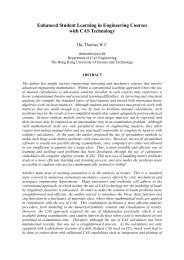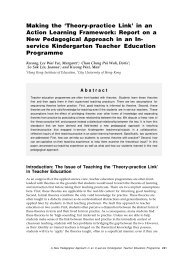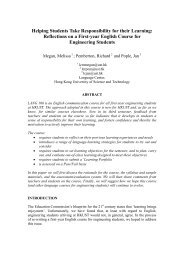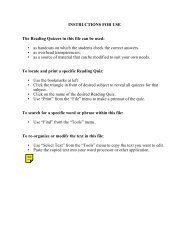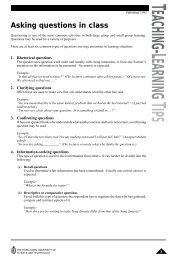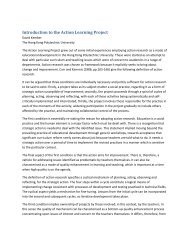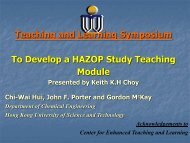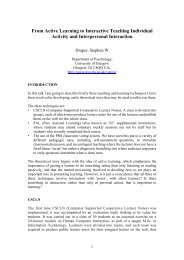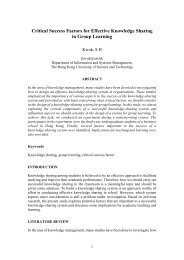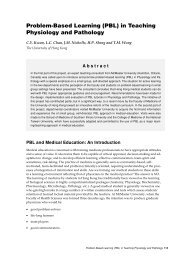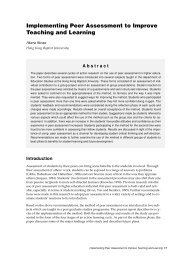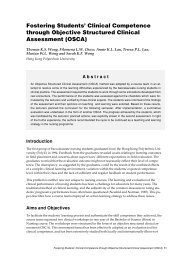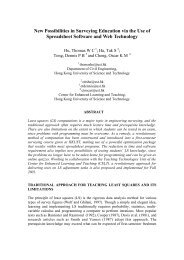Introducing Problem-Based Learning to Teacher Education ...
Introducing Problem-Based Learning to Teacher Education ...
Introducing Problem-Based Learning to Teacher Education ...
Create successful ePaper yourself
Turn your PDF publications into a flip-book with our unique Google optimized e-Paper software.
97/98<br />
(1 st cycle)<br />
98/99<br />
(2 nd cycle)<br />
99/00<br />
3 rd cycle)<br />
Did you find the learning approach interesting 3.8 3.4 3.8<br />
Have you enjoyed the learning process 3.9 2.8 3.7<br />
Did you find that focusing the course on real problems made the<br />
course seem more relevant <strong>to</strong> your interests<br />
4.0 3.8 4.0<br />
Did working in groups mean that you learned from each other 4.2 3.8 4.0<br />
Have you unders<strong>to</strong>od the technical materials of the course better than<br />
if it had been lectured in the conventional way, i.e. didactically<br />
Do you think you have learned as much technical materials as you<br />
would on a conventional lecture course<br />
Considering the material you have learned, do you think you have<br />
learned it more thoroughly than you would on a conventional<br />
course<br />
Has this course taken more or less time than other conventional<br />
lecture courses (In your assessment of the time taken by other<br />
courses, you should include the time you will spend on revising for<br />
the examinations.)<br />
Has this course helped you <strong>to</strong> develop communication skills<br />
effectively<br />
Has this course encouraged you more than the conventional lecture<br />
course, <strong>to</strong> use a deep approach <strong>to</strong> learning<br />
Is the level of difficulty of the problems appropriately set<br />
Would you like more problem -based learning (PBL) introduced in<strong>to</strong><br />
other modules within the curriculum <br />
3.8 3.5 3.7<br />
3.1 3.3 3.3<br />
3.9 3.8 3.7<br />
4.1 3.6 3.8<br />
4.7 3.6 3.7<br />
4.0 3.9 4.1<br />
3.3 3.1 4.0<br />
3.4 3.5 3.8<br />
Are you satisfied with the assessment methods used<br />
3.7<br />
3.1<br />
3.4<br />
Have you received sufficient direction during the learning process<br />
3.3<br />
3.0<br />
3.4<br />
Second Cycle<br />
Central <strong>Problem</strong><br />
<strong>Based</strong> on the feedback obtained from the first cycle, some background information was provided<br />
<strong>to</strong> students in the next year before they embarked on the problem-solving process. Lecturers<br />
involved were advised <strong>to</strong> give more guidance <strong>to</strong> students when it was deemed necessary and the<br />
scope of the central problem was widened <strong>to</strong> cover more areas. This was reflected in the following<br />
central problem for the second cycle.<br />
In the year 2000, a new curriculum of Graphical Communication will be implemented in<br />
prevocational and secondary technical schools in Hong Kong <strong>to</strong> replace the current<br />
Technical Drawing curriculum. <strong>Based</strong> on your previous working and teaching experiences,<br />
you are asked <strong>to</strong>:<br />
• Identify problems in terms of management, implementation, modes of teaching and<br />
learning, …etc. which will be faced by the school management team, subject panel and<br />
his team, and students themselves.<br />
• Propose strategies <strong>to</strong> resolve some of these issues.<br />
<strong>Introducing</strong> <strong>Problem</strong> <strong>Based</strong> <strong>Learning</strong> <strong>to</strong> <strong>Teacher</strong> <strong>Education</strong> Programmes 285



